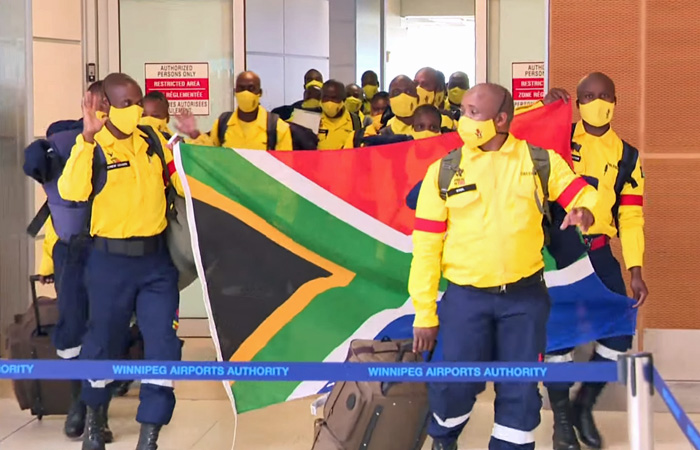The Manitoba government is sending sincere thanks to all the firefighters from other jurisdictions that came to assist the Manitoba Wildfire Service, including a large contingent from South Africa, and all the local crews who have tackled one of the worst wildfire seasons in the province in recent years.
“As Manitobans, we say thank you to everyone who answered the call for assistance as wildfires raged across our province due to the extremely dry conditions this summer,” said Conservation and Climate Minister Sarah Guillemard. “Just as Manitoba has sent firefighting crews to help in other provinces and other countries such as Australia in 2020, this year was our time to request the support of others. South Africa will forever hold a place in the hearts of Manitobans and be remembered as an international partner that we can count on should the need arise again in the future.”
Organized through the Winnipeg-based Canadian Interagency Forest Fire Centre, Manitoba received significant mutual aid assistance from across Canada in the form of personnel, aircraft and equipment under the Canadian Interagency Mutual Aid Resource Sharing Agreement. Included in the support were 120 wildfire-trained military personnel, other Canadian crews and equipment, and the special contingent that came all the way from South Africa.
The group of 109 men and women of the South Africa contingent arrived in Manitoba on Aug. 11 and was deployed to the large collection of fires known as the Loon Straits complex and to fires near Sherridon, Flin Flon and Snow Lake. The minister noted these hard-working firefighters were welcomed to these communities and brought professionalism and dedication to their jobs, as well as great team spirit shown through their colourful marching, chanting and singing at Richardson International Airport in Winnipeg upon their arrival and when moving through the communities where they were deployed.
“We leave Manitoba grateful for the opportunity to have been of service and will take home the lessons from this experience, including the extensive use of water pumps, long lines of hoses and the reliance on air transport to get to the fires,” said Trevor Abrahams, managing director, South Africa Working on Fire program. “We feel we fit in well with the local crews and appreciate the praise and support of the local fire commanders. The team enjoyed their camping experience near the fire line and some interesting encounters with the local bear population.”
The 2021 wildfire season is one of the most severe Manitoba has experienced since the record-setting season of 1989. Nearly 450 wildfires and more than 1.2 million hectares burned across the province this season. More than 4,000 Manitobans were evacuated from seven First Nations and three northern communities throughout the season, and two communities in eastern Manitoba remain evacuated while work is underway to restore power.




